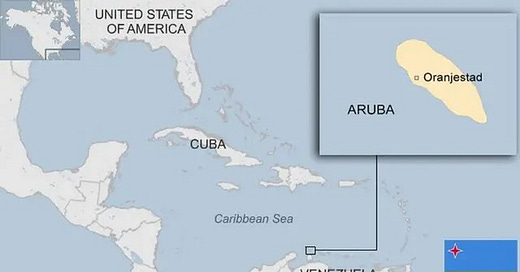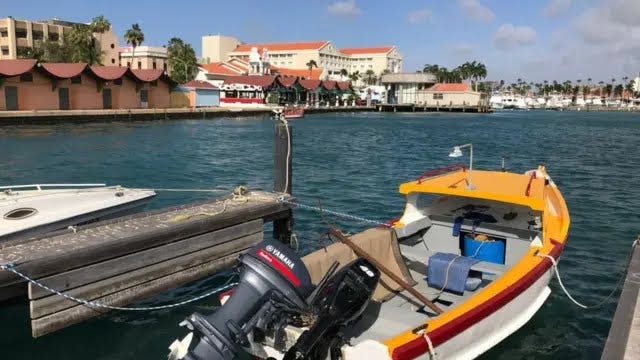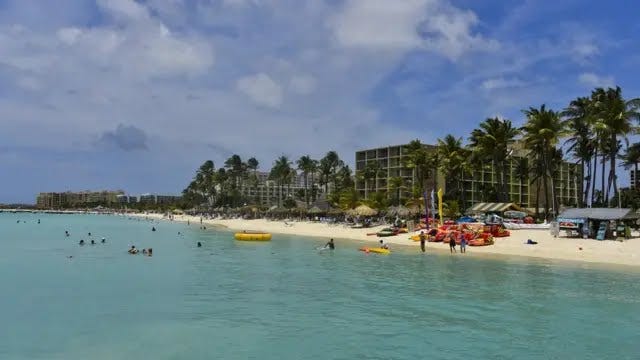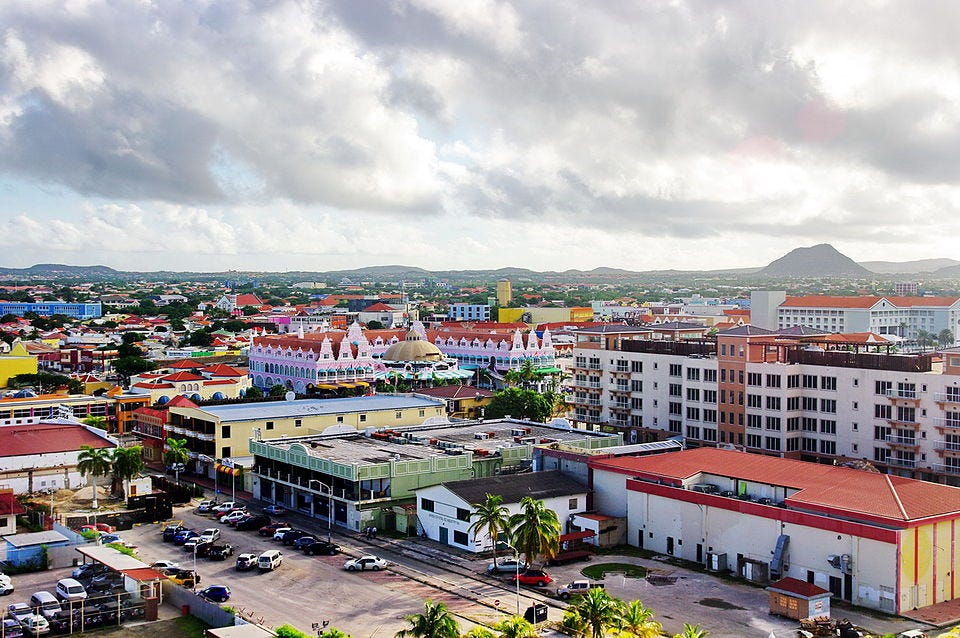Aruba profile
A tourist magnet and a fuel exporter, Aruba is an autonomous territory of the Netherlands and one of the most prosperous territories in the Caribbean.
A tourist magnet and a fuel exporter, Aruba is an autonomous territory of the Netherlands and one of the most prosperous territories in the Caribbean.
Colonised by the Dutch in the 17th Century, Aruba lies 25km north of the coast of Venezuela. Away from the beaches, hotels and casinos, much of the island is desert-like but a strong indigenous heritage, colonisation and Latin American influence have given it a distinctive social and linguistic character.
A gold rush in the 1820s triggered an economic boom, with an oil refinery opening a century later. Its temporary closure in 1985 sparked an economic crisis and Aruba has since invested in tourism which is its economic mainstay.
Aruba is susceptible to drug smuggling and illegal immigration but has passed laws to combat money-laundering.
In 1986 Aruba pulled out of the Netherlands Antilles - a federation of Dutch Caribbean territories - and obtained separate status within the Kingdom of the Netherlands. The Dutch government controls defence and foreign affairs while the island's government handles local matters.
COUNTRY OF ARUBA: FACTS
Capital: Oranjestad
Area: 180 sq km
Population: 116,500
Languages: Papiamento, Dutch
Life expectancy: 73 years (men) 78 years (women)
LEADERS
Head of state: The King of the Netherlands, represented by a governor.
Prime minister: Evelyn Wever-Croes
Evelyn Wever-Croes was sworn in as Aruba's first female prime minister in November 2017.
A former tax lawyer, Wever-Croes began her political career in 2009 when she was elected to parliament as a member of the People's Electoral Movement (MEP). After only two years, she was elected to lead the party.
Under her leadership, the MEP won nine seats in the 2017 parliamentary elections, which allowed her to form a government with her coalition partners, Pueblo Orguyoso y Respeta (POR) and RED Democratico (RED).
She was returned to power after the June 2021 parliamentary elections at the head of a coalition government, as no party won an absolute majority.
MEDIA
Image caption,Papiamento-language newspapers are the most widely read dailies in Aruba
Aruba observes freedom of the press, as guaranteed under Dutch law. The mostly widely-read newspapers are in the Papiamento language.
There are two commercial TV stations. A cable TV subscription service provides access to foreign channels and there are a wide range of commercial radio stations available.
TIMELINE
Image caption,Tourism has replaced oil refining as the island's economic mainstay
Some key dates in Aruba's history:
2500 BC-1515 - First inhabited by Amerindians of the Arawak tribe.
1499 - Spanish explorer Alonso de Ojeda discovers the island and claims it for Spain.
1636 - Aruba is colonised by the Dutch and forms part of the Dutch West India Company.
1806 - Aruba comes under British rule during the Napoleonic Was but is returned to the Dutch in 1816.
1954 - Aruba becomes part of the autonomous federation of the Netherlands Antilles.
1971 - Pro-independence struggle led by the People's Electoral Movement party (MEP) seek separation from Dutch Antilles administration.
1986 - Aruba obtains autonomous status within the Dutch kingdom.
1990 - Transition to full independence is postponed indefinitely at Aruba's request.
1996 - Aruba is included on US list of major drug-producing or transit countries.
2009 - OECD removes Aruba from an international list of uncooperative tax havens after it improves standards of transparency.
2017 - Evelyn Wever-Croes is sworn in as Aruba's first female prime minister.
Image caption,Aruba is the most touristed island in the southern Caribbean
The BBC
aruba economy
Overview
Aruba's economy is heavily reliant on tourism, with an estimated 89.9% of economic activity generated directly, indirectly, or induced by this sector. The tourism industry's rapid growth in the past 80 years has spurred related industries like construction. While Aruba's GDP has increased significantly over the years, the economy is expected to experience slower growth in 2024 due to factors like the tourism sector reaching capacity and declining investment, especially in construction.
Here's a more detailed breakdown:
Key Features:
Tourism-Driven:
Aruba's economy is highly concentrated on tourism, with a large portion of its economic activity generated by the sector.
Tourism Growth:
The tourism industry has been a major driver of economic growth in Aruba, with related industries like construction also benefiting.
Economic Expansion:
Aruba's economy saw robust growth in 2023, with real GDP rising by an estimated 5%, primarily due to the strong performance of the tourism sector.
Slowing Growth in 2024:
Economic growth is projected to slow down in 2024, reaching 1.2%, due to factors like the tourism sector reaching its capacity and declining investment.
Balance of Payments Surplus:
In the first half of 2024, Aruba experienced a surplus on its balance of payments, resulting in increased official and international reserves, according to the Centrale Bank van Aruba.
Inflation:
Prices increased by 1.7% in the 12-month period from June 2023 to June 2024, according to the Centrale Bank van Aruba.
Political Stability and Legal Framework:
Aruba has a democratic government, a stable political environment, and efficient legal and regulatory frameworks, according to Invest in Aruba.
Challenges and Opportunities:
Reliance on Tourism:
While tourism is a major strength, excessive reliance on this sector can make the economy vulnerable to external shocks like pandemics or economic downturns in major tourist markets.
Diversification:
Efforts to diversify the economy beyond tourism, potentially through other industries like technology or renewable energy, could help mitigate risks and create more sustainable growth, according to Invest in Aruba.
Investment:
Attracting and retaining foreign investment is crucial for further economic development and diversification.
Human Capital Development:
Investing in education and training programs can help develop a skilled workforce that is better equipped to meet the demands of a growing economy, according to the World Bank.
Economy of Aruba
Article Talk
The economy of Aruba is an open system, with tourism currently providing the largest percentage of the country's income. Because of tourism's rapid growth in the last 80 years, related industries like construction have also flourished in Aruba. Other primary industries include oil refining and storage, as well as offshore banking. Despite the island's low rainfall in the past year, the people[who?] have proven that Aruba's soil is full of nutrients and many crops do amazingly well in the soil[citation needed]. Many more locals have started participating more to horticulture, permaculture and agriculture. Creating a start to an internal economy. Aloe cultivation, livestock, and fishing also contribute to Aruba's economy. In addition, the country also exports art and collectibles, machinery, electrical equipment, and transport equipment. Aruba's small labor force and low unemployment rate have led to many unfilled job vacancies, despite sharp rises in wage rates in recent years.
Economy of
Aruba
Centre of Oranjestad in 2011.
Currency
Aruban florin (AWG)
1 US$ = 1.80 AWG (Jan. 2025)
Fiscal year
Calendar year
Statistics
GDP
Increase $4.45 billion (nominal, 2025 est.)
Increase $5.9 billion (PPP, 2025 est.)
GDP growth
0.5% (2016) 2.3% (2017)
1.2% (2018e) 0.7% (2019e)
GDP per capita
Increase $41,498 (nominal, 2025 est.)
Increase $55,056 (PPP, 2025 est.)
Source: Wikipedia








